Introduction
Following in the footsteps of your idols is, undeniably, a great way to learn and grow. Learning from their experience, failures, successes, and how they conducted things is a great way to determine your next best step as a leader. Project management quotes from these remarkable figures often provide valuable insights and guidance.
I too, look up to leaders who have shaped the course of time. Leaders like Mother Teresa, Michele Obama, and Eleanor Roosevelt, have helped me bring great strides in my work as well as my personal life. And, whenever I feel down and unsure of myself, I can always look back to everything they say, do, and practice.
Here at ProofHub, we consider it a good exercise to derive inspiration from leaders who have led with these impeccable legacies. And I thought, if we can benefit from these, you can too!
Thus, we compiled the best quotes about project management that will help you lead your teams and manage your agendas better. With that, I also hope to tell you how you can implement these in your real-life leadership roles.
17 Best project management quotes
About driving away project management blues
1. “Sooner or later, those who win are those who think they can.” — Paul Tournier
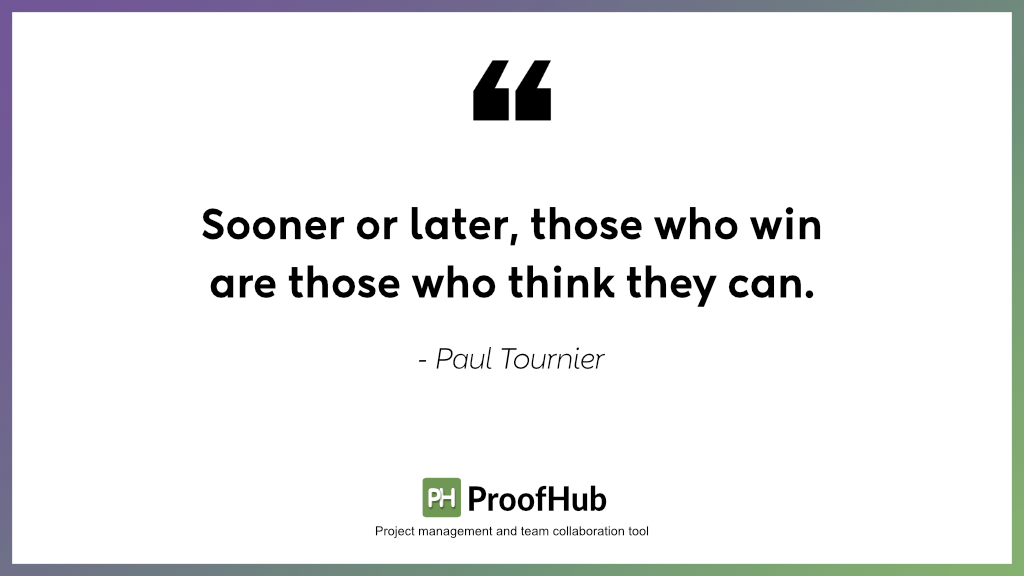
Do you believe this theory — That everything we think must happen, does happen?
Here’s what I think: The way I see it, management is all about a vision. We create goals and targets, and then we map out a way to get to them. So, the initial picture that we have of a project and its scope is just that — a vision.
The next step, as Paul Tournier would agree, is to believe in your capabilities and your team’s tenacity to achieve said goals. And if you believe you can create a path that can get you to your goals effectively, then consider yourself halfway there!
2. “You gain strength, courage, and confidence by every experience in which you stop to look fear in the face. You must do the thing you think you cannot do.” — Eleanor Roosevelt
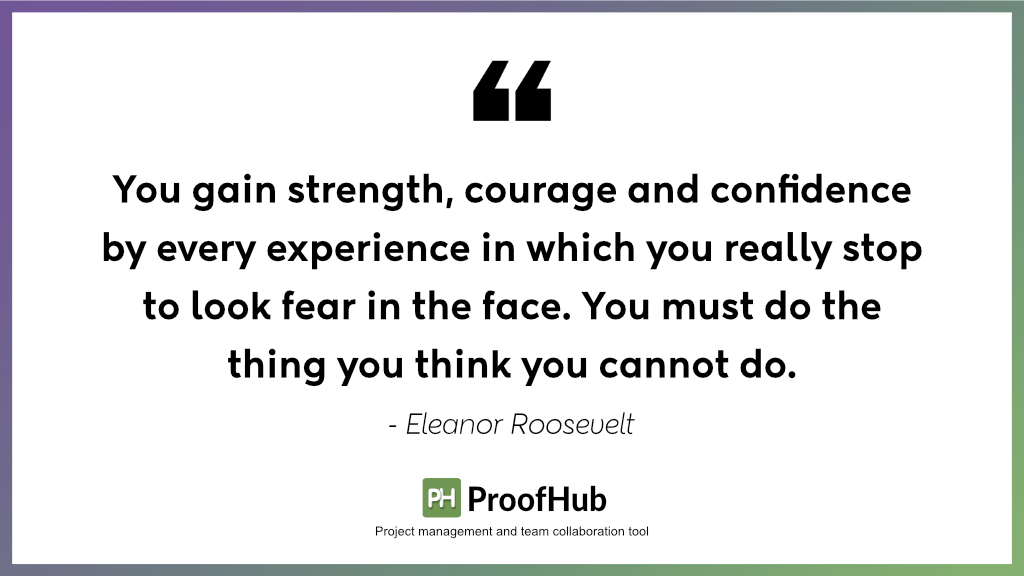
Eleanor Roosevelt never fails to deliver. By this quote, I am sure what she meant was that project management isn’t a skill that you are born with and it is not something that will help you succeed from day one.
Management of projects, time, people, and tasks is something that comes naturally with experience. It does involve a lot of study and research but mostly the learning process involves a fair share of hit and trial.
Can you implement this in life? Yes.
The best way to implement this would be to maintain a positive work environment. That, I feel, originates automatically when the people are comfortable and feel welcome. I usually maintain such an environment here at ProofHub by:
- Talking about achievements.
- Giving feedback in which I state how important the employees are to the organization.
- Setting up motivational workshops.
- Organizing team building activities.
- Giving recognition to team members.
3. “Progress doesn’t come from early risers — progress is made by lazy men looking for easier ways to do things.” — Robert Heinlein
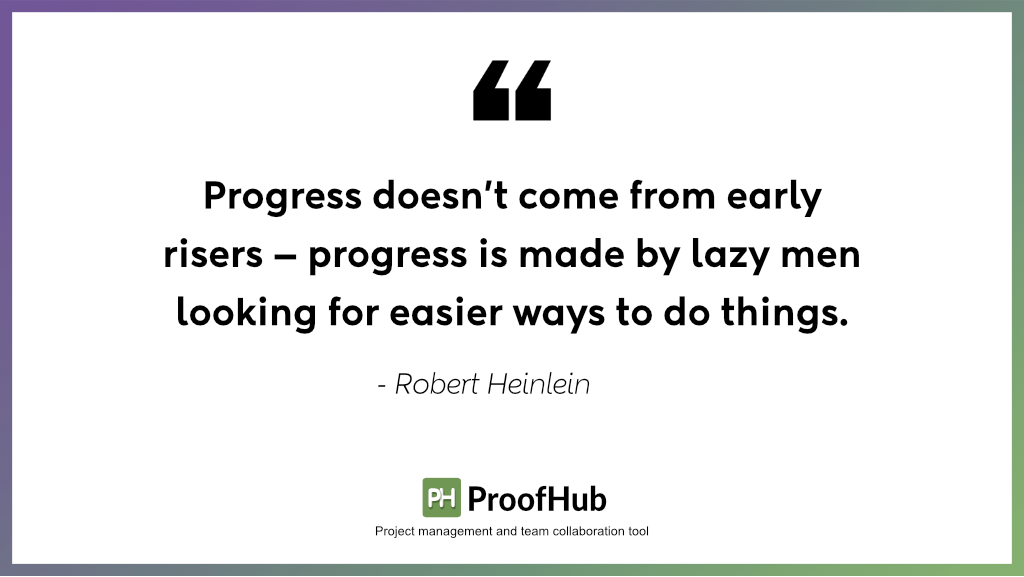
I believe what Robert Heinlein meant when he so articulately penned down this quote was that innovation helps managers achieve their dreams more than anything else. This saying also emphasizes how smart work can help us accomplish a lot more than just hard work.
This reminds me of the time my partner was assigned a project and the first thing he did was appoint a team member to find the easiest possible path to completion. This saved them months of hard work.
And you can implement this too! Achieve innovation by simply:
- Doing your research.
- Looking at the problem with all approaches.
- Keeping track of what your competitors are up to.
- Take an inventory of your resources.
About the science behind project management
4. “Project management is like juggling three balls: time, cost, and quality. Program management is like a troupe of circus performers standing in a circle, each juggling three balls and swapping balls from time to time.” G. Reiss
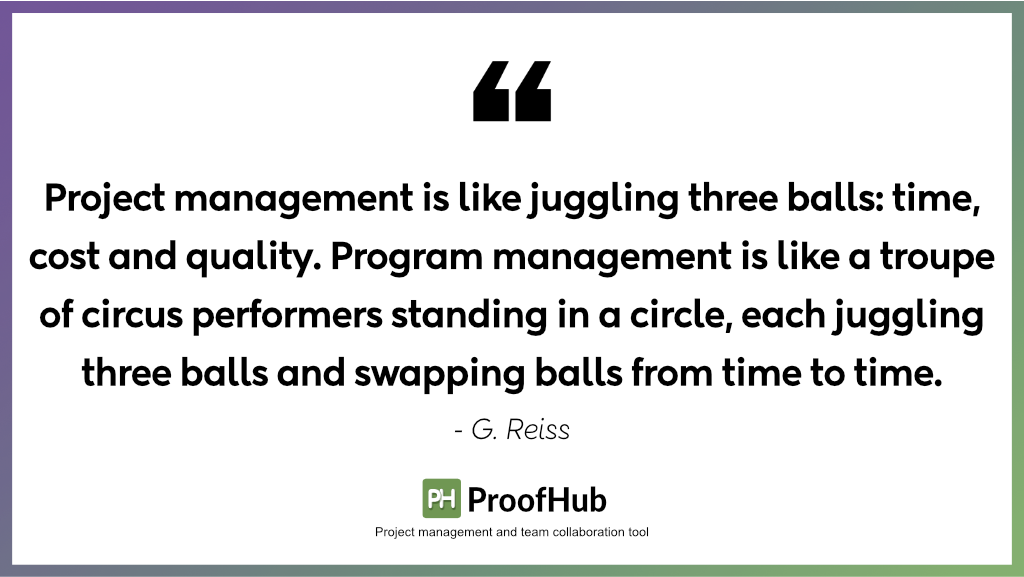
Project management is intricate. There are too many variables to take care of. And even though there are times when this will feel less than doable, you will find that you can juggle all three.
Can this be implemented in real work scenarios? Of course, it can be!
I know that the best way to manage time, resources, and quality is to simply keep an accurate track of the three. And, that can be done easily with the help of an automation tool that helps you with time tracking, resource allocation, and task management.
There are so many software platforms that can help you automate almost all your work processes. If you ask me, you must invest in an all-in-one tool for a hassle-free experience in project management.
5. “Of all the things I’ve done, the most vital is coordinating the talents of those who work for us and pointing them towards a certain goal.” — Walt Disney
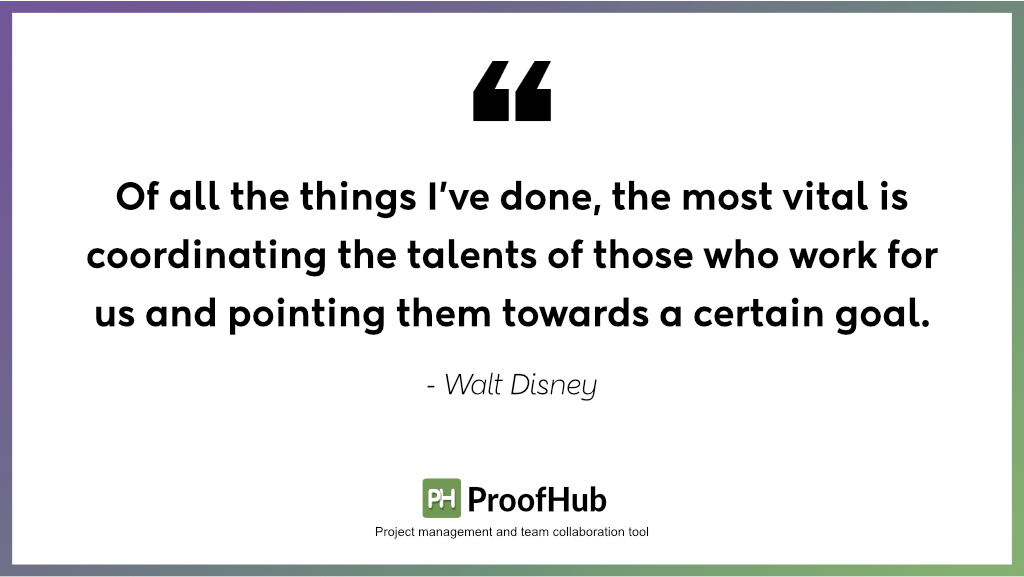
Project management is more than a form of art, it is also a science. It is a responsibility where you put all the pieces together in an accurate order. But you can’t hope to achieve goals without a team. And, when you do have a team you must use all the strengths of your people to get to the targets effectively.
Can you implement this in life? Yes.
All you need to do is communicate with your employees. Give them the necessary feedback, talk to them about their interests and strengths, and try to find what they are passionate about.
- You must disclose the scope of your project to the team.
- Let them know about all that is expected from them.
- Give them detailed feedback so they know about all the areas that need improvement.
- Have discussions about company goals and how you can all work together in their direction.
This will not only help the whole project move more efficiently, but it will also help you keep your employees happier.
6. “No matter how good the team or how efficient the methodology, if we’re not solving the right problem, the project fails.” — Woody Williams
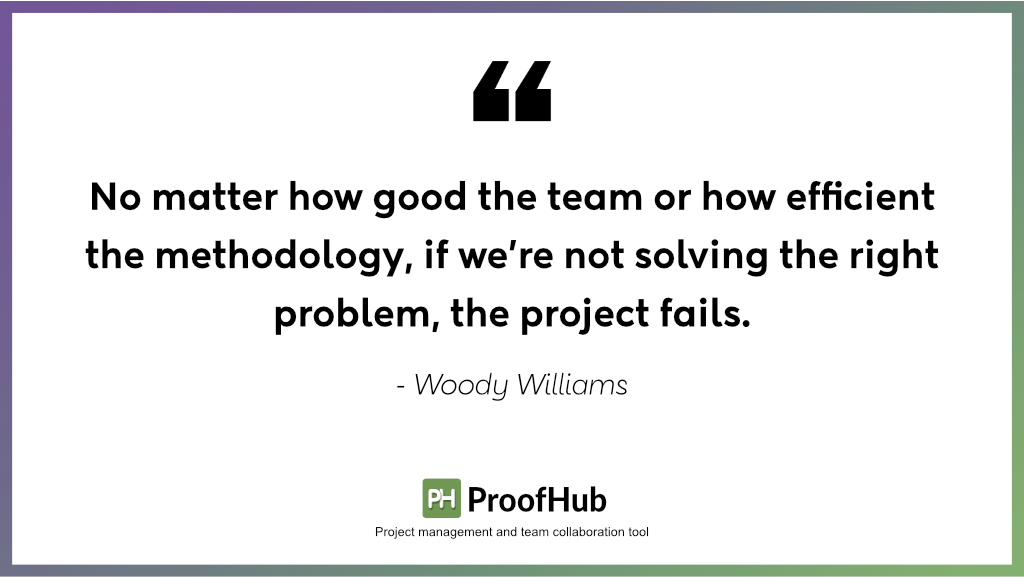
The science of project management is easy to determine.
All you have to know is what you want in the end. It is like a math question you already know the answer to. You just have to determine which formula is likely to take you the shortest amount of time to solve the said question.
So, can you implement this in life? Is finding the right problem an actual solution?
I think what Woody Williams meant when he so eloquently said this quote is that you need to identify what you have and what you want before you start mapping your way up to the top.
I feel like what he was trying to tell us and the future leaders who want to be fluent in management are that we need to find the holes in our plan, and along with that;
- We must have a plan B for absolutely everything.
- We must prepare risk management strategies.
- And, we must do inventory for all our resources firsthand.
About planning to have a successful project
7. “I feel that the most important requirement in success is learning to overcome failure. You must learn to tolerate it, but never accept it.” — Reggie Jackson
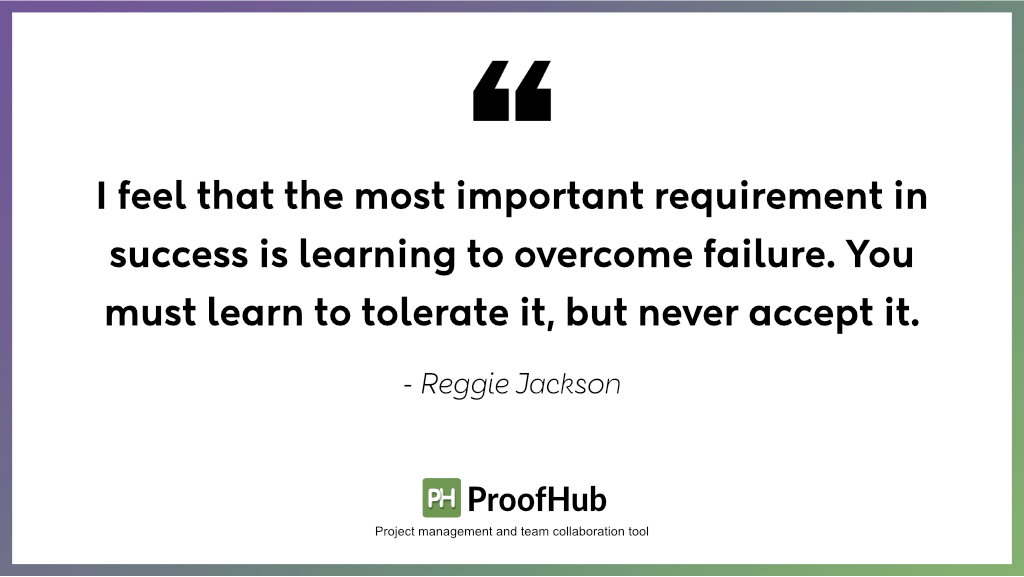
Managing projects is no easy feat! Many variables have to be juggled at the same time and success isn’t always determined. But you already know all of that. What we don’t always know though is how much we can learn from past experiences.
Time is indeed the best teacher, and it is an undeniable fact that we get better with time. Leaders get better with time as well. As we face new challenges and problems, we learn to overcome all kinds of hardships.
The key to implementing this is to carry these lessons with you.
For example, if something goes wrong in my marketing campaign, like, we are unable to tap into a certain group of audience, I will make sure to determine what went wrong so this mistake can never be repeated.
8. “By Failing to prepare, you are preparing to fail.” — Benjamin Franklin
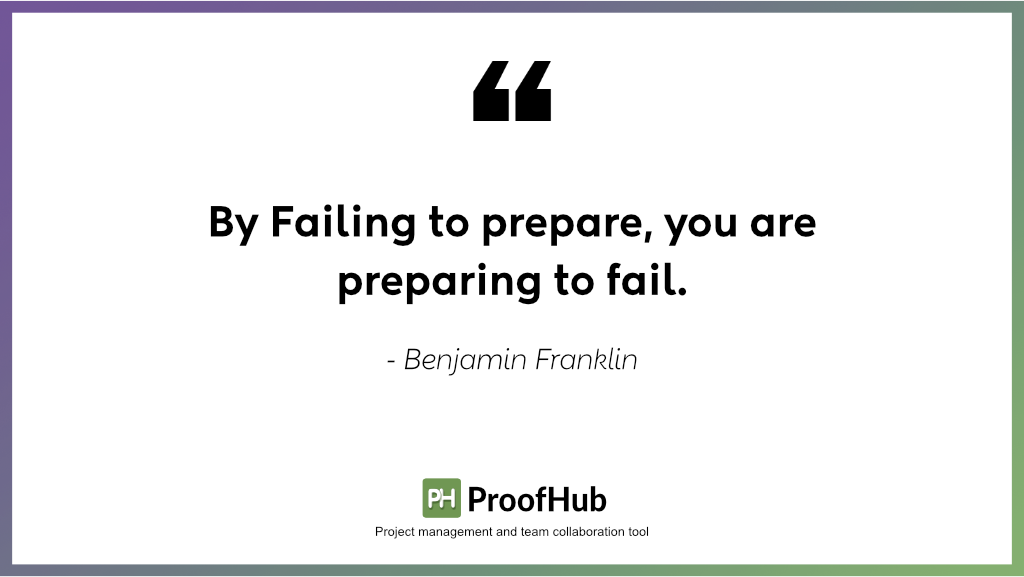
Benjamin Franklin gifted us with a brighter, much safer tomorrow. He dreamt, he planned, he gathered resources, and he put in all his efforts. Project managers would agree that nothing big is achieved without a plan.
Best-laid plans require preparation. And the best way to be prepared is to:
- Have complete knowledge of what your competitors are up to.
- Be aware of the ongoing trends in the market or on the web.
- Keep your team in the loop about new developments.
- Browse different project management tools and techniques.
9. “Trying to manage a project without project management is like trying to play a football game without a game plan.” — Karen Tate
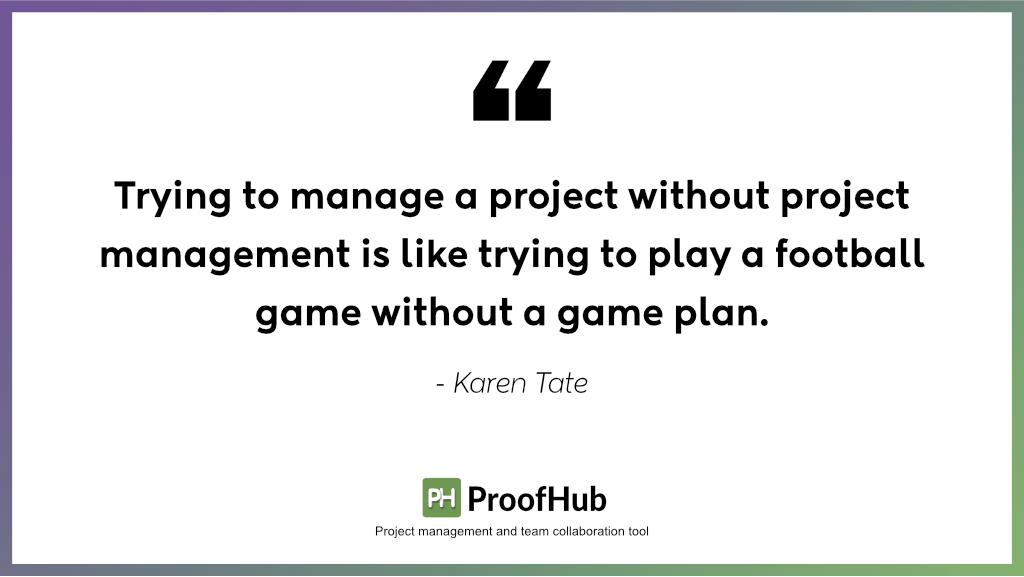
Again, as I said, a plan is the blueprint for a successful project. Karen Tate believed that having no plan is equivalent to destined failure. As a former Project Management Institute board member, she rightly said that the only way to succeed is by following a structured approach.
A football game without a game plan is when you don’t know about the strengths and weaknesses of your opponents. It also means that you don’t know what strategy is going to help you take them down. These blaring holes in your plan can do more damage than you think.
When we make a plan keeping every detail in mind, we are setting a project into motion that has little to no chance of failing.
About balancing time with the number of tasks
10. “Time is the scarcest resource and unless it is managed nothing else can be managed.” — Peter Drucker
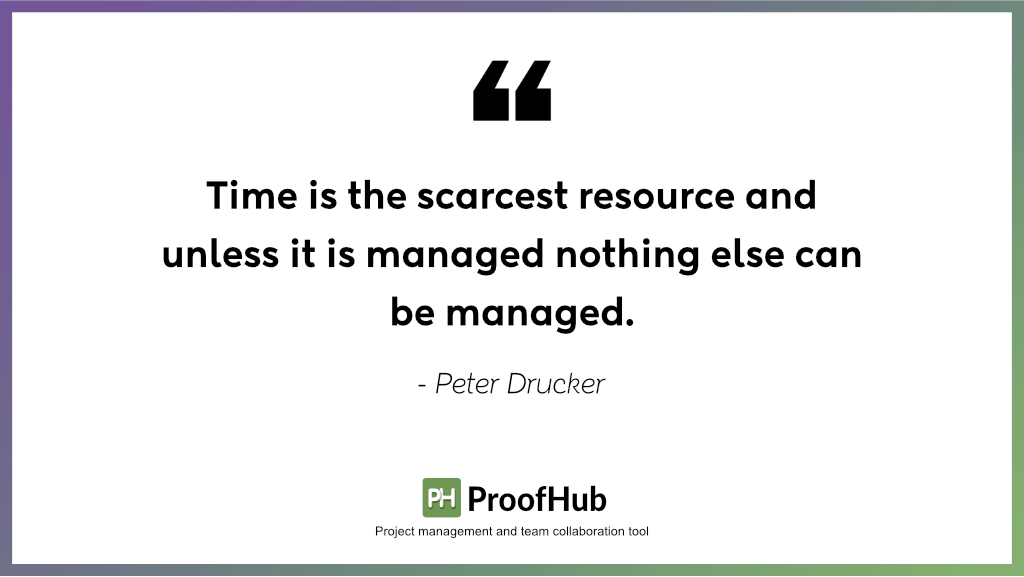
Time management — We all understand it, we all value it, we all want to see it happen but time is one slippery fish in the pond. I believe what Peter Drucker wanted to convey with this quote is that time is limited and the chances of the success of a project directly depend on how we manage this scarce resource.
I do feel that time can be managed. Here’s how:
- Know how much time you have.
- Set aside a margin of time so you have a fallback strategy.
- Determine exactly how many tasks you have corresponding to the manpower.
- Manage your time by prioritizing and delegating tasks responsibly.
11. “It’s not enough to be busy, so are the ants. The question is, what are we busy about?” — Henry David Thoreau
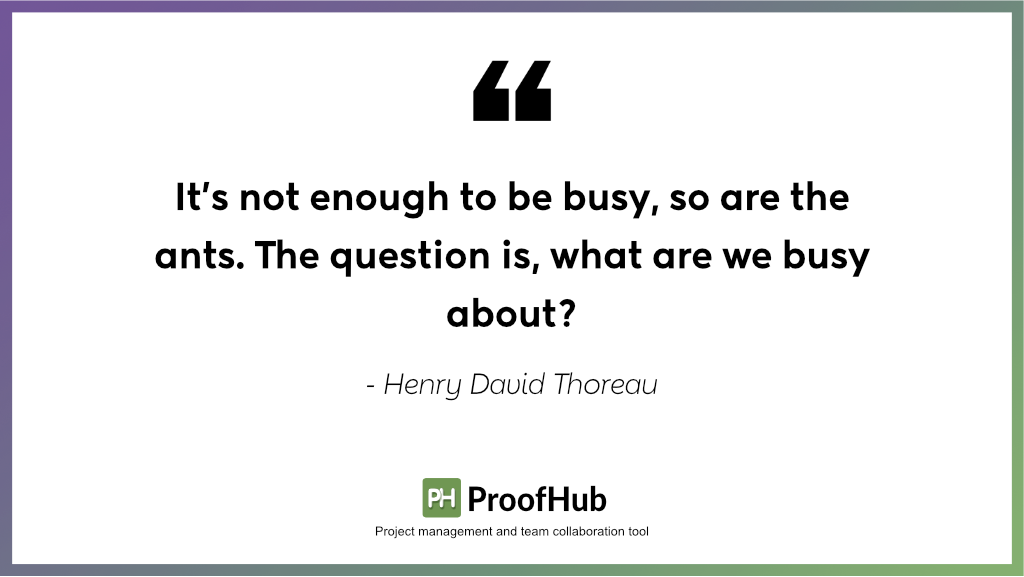
The thing that Henry David Thoreau caught about project management, or rather, time management is that it is necessary to keep a tab on what is being done. A leader must be aware of what everyone is working on.
Why?
Sometimes we tend to dive head-first into the tasks we are assigned and we forget about the tasks that follow, might even budge the deadlines at times. If you haven’t done this yourself, I’m sure you’ve seen other members of your team do it.
It happens, and that’s alright.
Monitoring activities and project progress can be made into reality. Learn how:
- Keep track of what the team is up to with a time-tracking software platform.
- And, track the project’s progress using a project management tool.
- Get a tool that will help you view the whole timeline of the project in one place.
- A scheduling tool will also help you accomplish tasks within the given deadlines.
12. “Give me six hours to chop down a tree and I will spend the first four sharpening the axe.” — Abraham Lincoln
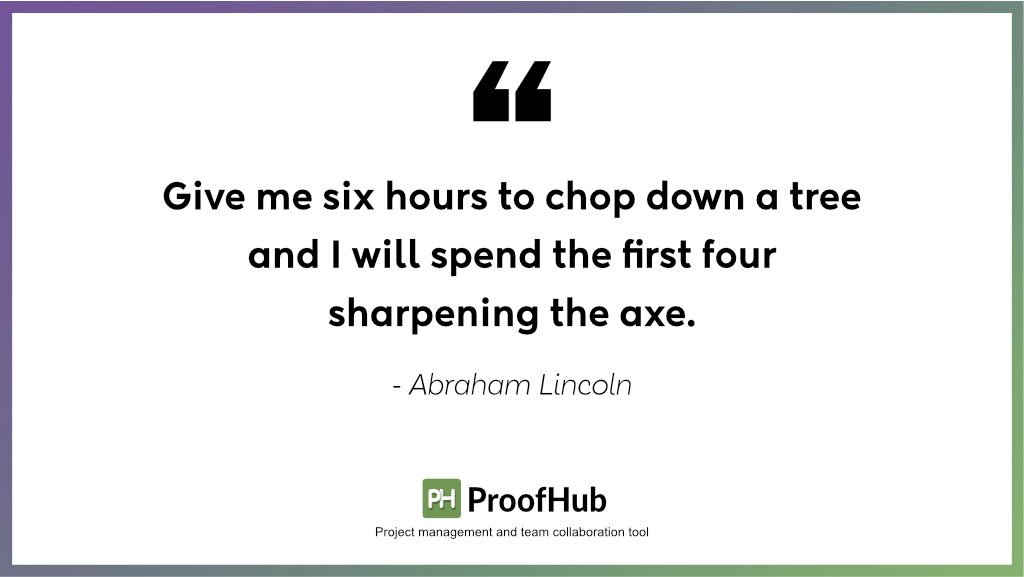
Abraham Lincoln, the fearless leader of our rich history left us numerous crumbs of wisdom that we are still chewing on. With this quote, I feel that he is trying to say that even with the resource of time, what you decide to do with it is what matters.
All the hours could count up to be more than what you need, but if you are not making the most of every minute, doing things that will constructively help you achieve your dreams, you might as well give up.
I feel that this too can be implemented. All you have to do is:
- Fuel your resources.
- Track all your activities and the status of the resources.
- Try to cut down on casual conversations to make the team more goal-oriented.
- Give feedback sessions to your team stating the importance of staying on task.
About failure & project management
13. “If everything seems to be going well, you obviously don’t know what’s going on.” — Edward Murphy
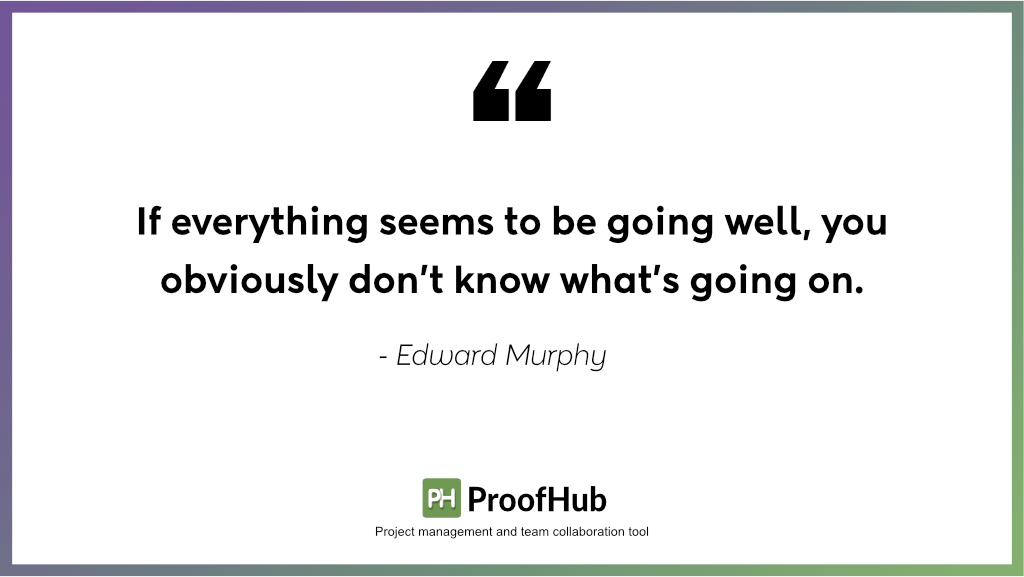
I believe Edward Murphy was trying to warn us. By saying these words, I believe he was trying to tell us that troubles will not come bearing red flags. Even when everything seems to be going right, project managers need to intervene to find out what every team member is doing and at what pace the progress is being made.
How do you generally take care of these invisible lags and problems in the duration of your project?
I know what I do and it never fails to work.
- We run scenarios in the planning stages to rule out all the possibilities of things going sideways. We prepare plans that can help us get out of sticky situations.
- And, we believe that resources must also, should be readily available.
Tracking progress in this case too makes a big difference. When you can monitor everything that is going on, it becomes easier to keep tabs on the ever-changing numbers.
14. “There are no failures, just experiences and your reactions to them.” — Tom Krause
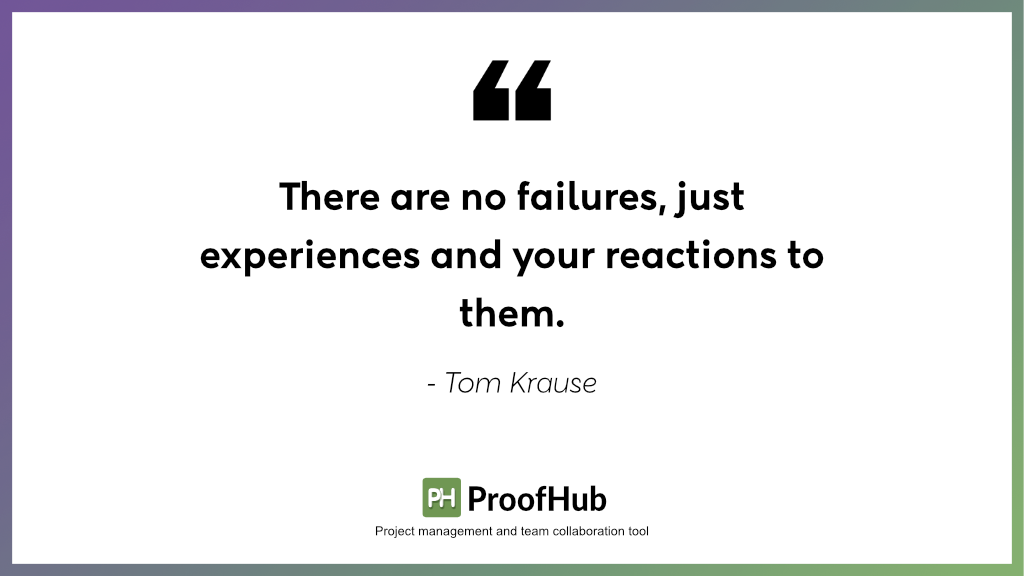
I think Tom Krause could not be more right about this. Failure is inevitable when you are still learning. But it is our choice to treat these failures like the stepping stones that are eventually going to take us to success.
This is what our teams expect of us. Not rolling over and pretending that nothing happened, but going over the things that went wrong and determining what can be done to make them right the next time.
What matters is your reaction to failure.
Did you take responsibility?
Did you try everything you could to salvage what was left of the project?
Determining these things is what gives you the foundation to build a rock-solid future project.
About team communication & collaboration
15. “The single biggest problem in communication is the illusion that it has taken place.” — George Bernard Shaw
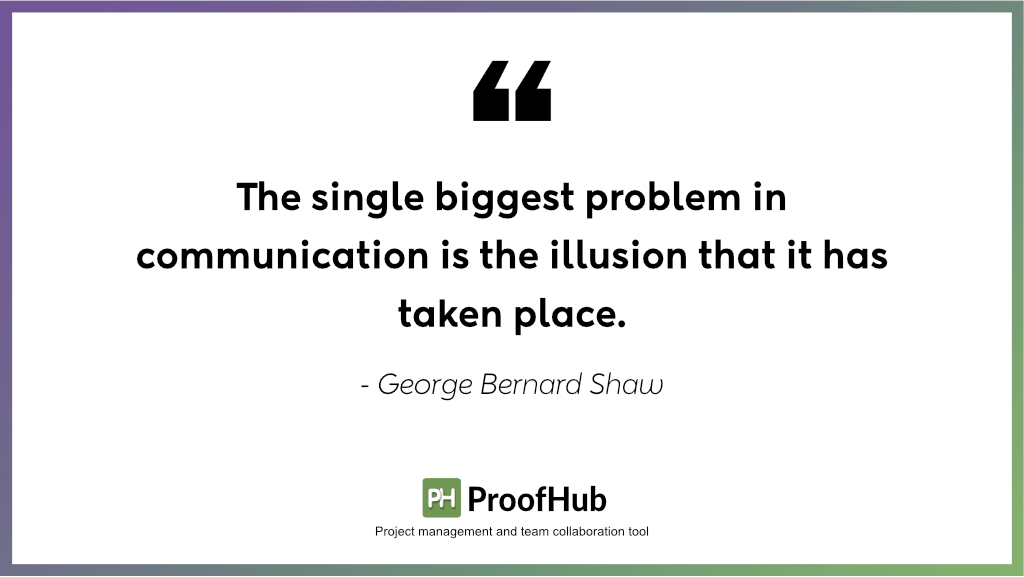
Team communication is the most important parameter when we talk about a project that is functioning efficiently. I think what George Bernard Shaw wants to say here is that there is a big difference between communication and effective communication.
I feel that welcoming effective communication into the workplace is an easy feat. We exercise this at ProofHub in the following ways:
- We conduct meetings with a predefined agenda.
- We come prepared for brainstorming sessions.
- We have discussions, both casual and work-related.
- And, we have dedicated tools for casual and work-related communication.
16. “Communication is a skill that you can learn. It’s like riding a bicycle or typing. If you’re willing to work at it, you can rapidly improve the quality of every part of your life.” — Brian Tracy
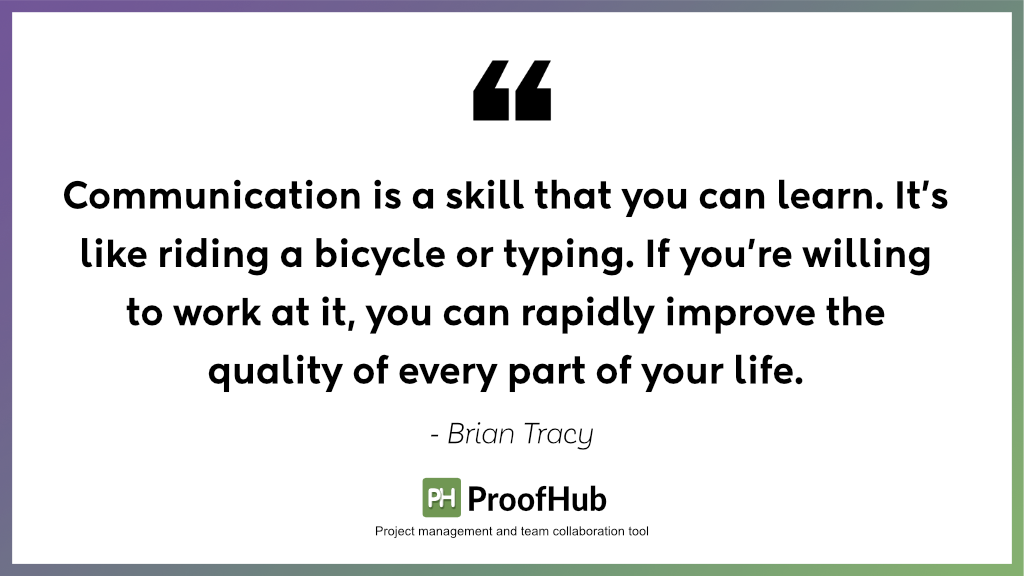
Brian Tracy, a motivational speaker from Canada certainly knows what he’s doing. When Mr. Tracy says communication is a skill you can learn, he’s right. Don’t believe me? Then tell me why are there more than a dozen great books about it.
Communication between a team should be seamless if we expect good results at the end. If there is no coordination between the team, you can kiss your dream team and your dream project goodbye.
I feel that there are so many things we can learn from this quote, for instance:
- Learn to channel the communication that is constructive and helpful to the people around you.
- Use proper communication channels, discussions, documenting ideas, reviewing work, and having personal conversations.
- Learn to be more expressive as a leader so you can persuade others to do the same.
- And, learn to be more transparent as it will ensure that you get loyalty from your employees.
How do project management & leadership go hand in hand?
17. “Managing projects, people, conversations, and resources are all part of a puzzle that you cannot solve without the leadership mindset.” — Sandeep Kashyap
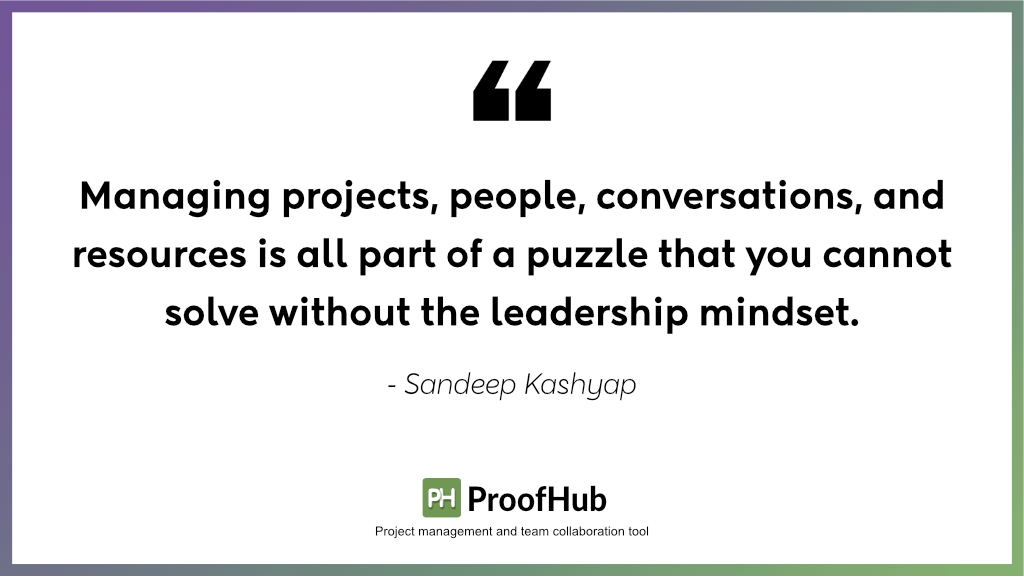
What I have learned from all of these sayings by these brilliant people mentioned above is that projects are made up of many moving parts. And, if you focus on the manageable ones, a lot is possible. And you know who can make that distinction? A leader.
With a leadership mindset and a project management background, you know your team and you know where to go. It is a perfect cocktail for success.
Do you want to know how we incorporate being a leader into the whole perspective of project management?
We do it by using a tool that helps us collaborate and manage projects.
ProofHub is one such tool. It helps managers like us easily
- Create projects.
- Break projects into tasks and subtasks.
- Assign tasks to various project members.
- Create notes for attempting various tasks.
- Discuss progress and document various ideas.
Conclusion
I hope you geeked out over all these valuable quotes by these amazing authors and leaders as much as I did. There’s certainly a lot we can learn from these impeccable people who have left us or are leaving us with such impressive legacies.
I hope as project managers, we finish what they started and maintain the steady achievement of collaboration and collective success.
Good luck!

